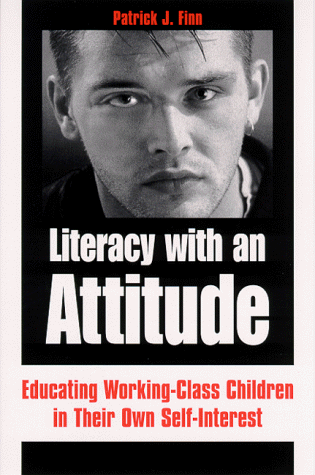For this weeks blog post on "Literacy with an
Attitude" by Patrick Finn, I chose to write extended comments about
Jessica's blog. For starters, I agree with Jessica that this weeks article was
extremely tedious and hard to get through. I think that however the article at
some points felt a little boring, Jessica did an excellent job of making some
really great and helpful connections to other texts that helped me tie my
thoughts together.
1. The first
connection that she made was associating one of Finn's quote that states,
"But, in fact I was schooling these children, not to take charge of their
lives, but to take orders" and "I had work assignments on the board
when the students entered the classroom, and so there wasn't a moment when they
didn't have anything to do. I didn't say to an errant student, ‘What are you
doing?’ I said, ‘Stop that and get to work.’ No discussion. No openings for an
argument" (Finn 4). I found it really interesting that Jessica connected
this quote to Delpit, because I was able to see the same similarities between
the two. One of Delpit's rules is that "if you are not already a
participant in the culture of power, being told explicitly the rules of that
power makes acquiring power easier." Finn, in fact recognizes and admits
to not following this rule when teaching his students. Finn simply would write
an assignment on the board without explaining explicitly to his students what
was expected of them. Finn just assumed that his students would understand what
they were supposed to do and produce efficient work. He also addresses that if
the student's were not doing what he wanted from them he would tell them
plainly to "stop that and get to work" he would not allow students to
explain they're feelings or opinions. He felt at the time that he was right and
that the students were wrong, but in fact according to Delpit, his student's
failure would be his mistake because he did not explicitly tell his students
his rules and what he wanted from them.
2. The second effective connection that Jessica made was
when she related the quote, “the
working-class children were learning to follow directions and do mechanical,
low-paying work, but at the same time they were learning to resist authority in
ways sanctioned by their community. The middle-class children were learning to
follow orders and do the mental work that keeps society producing and running
smoothly. They were learning that if they cooperated they would have the
rewards that well-paid, middle-class work makes possible outside the workplace”
(Finn 20) to Rodriguez. I thought it was really interesting that Jessica made the association between the two texts. When I first read this section of the
article, I did not make this connection, however, after reading Jessica's blog
and then re-reading the quote I instantly saw the connection. I could also see
that in Finn's article, he and his classmates had to alter themselves and give
up their "private identity" to be accepted into society as well as
become successful members in their communities. This is extremely relative to
Rodriguez's schooling experience where he was also forced by his teachers to
change himself and sacrifice his "private identity" in order to acquire his "public identity" so that he could prosper in the real-world.
3. Lastly, I really enjoyed reading Jessica's connection to her service
learning project. She addressed Finn's statement, "‘Just do your best. If they
learn to add and subtract, that's a bonus. If not, don't worry about it,’ A
second grade teacher said the children were ‘getting dumber every year,’ Only
twice did Anyon hear a teacher say ‘please’ to a student in an unsarcastic
tone. She heard ‘Shut up’ frequently” (Finn 11). Much like Jessica, I also hear a lot of
negativity towards students and a lot of sarcastic tones in my service learning
placement. I really respect my the third grade teacher that I assist at Bailey
Elementary School, however I disagree with some things she has said to and about her students.
I often hear her use the words "shut your mouth" to students who try
to give their opinions without being called on, in my opinion a very harsh
statement to make to a child who is only eager to share their ideas on the
given material. I have also heard a lot of negativity from my teacher about
some of her students academic ability and her lack of faith in their future
success. Once she told me that one of her students struggled with
spelling due to the fact that she is bilingual, she explained her to me by saying " her elevator does not go all
the way up to the top floor" (meaning that she is not too bright). She
also frequently points out students to me that she believes are just not
intelligent, she usually blames it on their parents, and then comments that she
doesn't see them being any different from their parents in the future. Much like Jessica, I find this language and attitude in the classroom to be very discouraging for the students. Students that come from less privileged communities are the ones that need the most genuine acceptance and confidence from their teachers to build their self-confidence and help them become successful.



I really enjoyed reading your blog! I did extended comments on Jess's Blog as well! Great job
ReplyDeleteI really liked how you made connections with Jess's blog and added your own opinions to it! Good job!
ReplyDeleteGreat response! I like this middle picture. That's always the worst within the classroom.
ReplyDeleteI really enjoyed your response to this article and the connections you made. Awesome job!
ReplyDelete